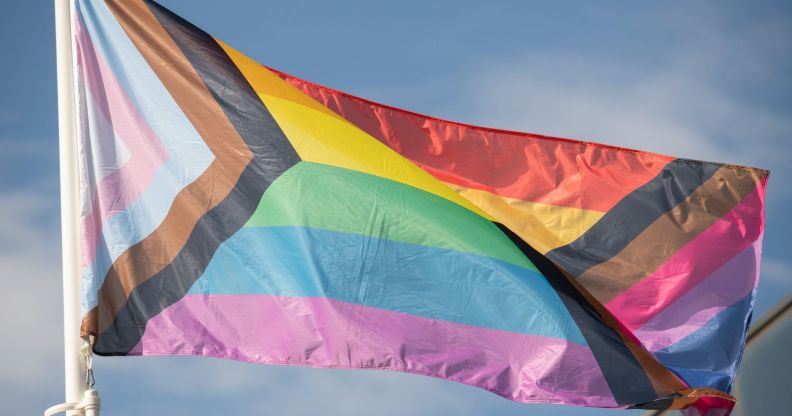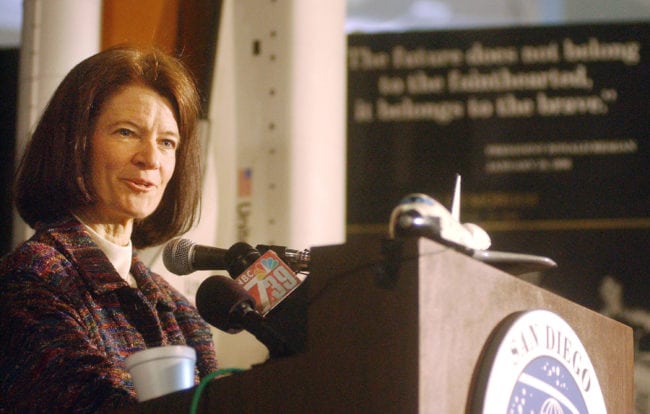10 LGBT scientists who made history to celebrate LGBTSTEM Day

People are losing their minds over Sadiq Khan sharing a picture of the bi-inclusive Progress Pride flag (Mayor of London Sadiq Khan)
July 5, 2018 marks the first international celebration of LGBTSTEM Day, an initiative organised by a group of associations working to support LGBT+ rights in the fields of Science, Technology, Engineering and Maths (STEM).
The days aims to bring visibility to LGBT+ scientists, more than 40 percent of whom remain closeted at work. According to the 2015 American Physical Society survey, nearly half of transgender or gender-non-conforming physicists experienced workplace harassment. LGBT students are also less likely to pursue a degree in STEM fields compared to their heterosexual peers.
“To solve the many diverse challenges humanity is facing in the twenty-first century we cannot afford losing people from minority backgrounds,” said Dr. Alfredo Carpineti, chair and founder of the British charity Pride in STEM—one of the main organisers of the initiative—in a press statement about the day.

“LGBTSTEMDay won’t fix all the issues, but it will shine a big light on them. We are sure it will start conversations, and that’s so important. Ignorance kills. It is time to stop pretending that the STEM disciplines are not influenced by politics and social changes. Some science might be done in a physical vacuum, but no science is done in a historical one,” Dr. Carpineti added.
In occasion of the historic occasion, let’s remember 10 queer men and women in science who changed the world—a list by no means exhaustive, as many more LGBT+ scientists keep working every day to contribute to human knowledge.
Find the 10 possibly queer scientists listed below:
1. Leonardo da Vinci
The archetypal Renaissance man made significant contributions to various fields of the sciences and the arts—and lived his life as an openly gay man, according to Walter Isaacson’s recent biography of the artist and inventor.
2. Sir Francis Bacon
Sometimes referred to as the “the father of modern science” for developing the scientific method of investigating an hypothesis, Bacon was also a politician, a philosopher and a jurist. His fellow member of parliament Sir Simonds D’Ewes, a puritan, outed Bacon in his “Autobiography and Correspondence” in a passage that, according to gay history writer Rictor Norton, was suppressed from the book’s published version in 1845 and largely ignored by Bacon’s biographers.
3. Sir Isaac Newton
The scientist who first understood how gravity works was known to be an introverted character who suffered from mental health issues. He left no private diaries and little correspondence and, according to Oxford University’s Newton Project, it remains disputed whether the troubled scientist was a “repressed homosexual,” but “if true [this] would undoubtedly have placed a man of his background and upbringing under extreme mental strain.”
4. Florence Nightingale
Nightingale devoted her life to helping the sick and the poor, played a key role in helping wounded soldiers in the Crimean War and is referred to as the founder of modern nursing. A deeply religious woman and an icon of the Victorian era, her sexuality remains disputed—but a controversial BBC documentary in 2001 suggested the “Lady with the Lamp” was a repressed lesbian.
5/6. Sara Josephine Baker and Louise Pearce
The two American women both made huge contributions to public health, and knew each other. Baker, a doctor, devoted her career fighting infant mortality in New York’s poorest neighbourhoods, while Pearce helped develop a treatment for a deadly African sleeping sickness through her work as a pathologist at the Rockefeller Institute. The two women lived together with author and scriptwriter Ida A. R. Wylie, who reportedly self-identified as a “woman-oriented woman.” The three women were all members of Heterodoxy, a feminist luncheon club whose membership was largely made up of lesbian or bisexual women.
7. Alan Turing
A well-known mathematician, Turing’s ingenious invention of the Enigma machine allowed to decode Nazi Germany’s secret communications, playing an instrumental role in the Allies’ victory of World War II. His namesake Turing machine is considered a model of a general purpose computer, serving as a predecessor of modern-day computers. But despite his history-making contributions, Turing fell victim of British laws criminalising homosexuality when he acknowledged a relationship with another man as part of a police investigation into a burglary at his home. To avoid going to prison and continue his work, he was made to undergo a hormonal treatment that made him impotent and caused gynaecomastia. He killed himself two years later, in 1954.
8. Sally Ride
Ride was the first American woman to travel to space and remains the youngest US citizen to claim that achievement. An engineer and a physicist as well as an astronaut, she married fellow NASA space traveller Steve Hawley in 1982, but the two divorced five years later. After her death in 2012, it was revealed she had spent the previous 27 years of her life in a relationship with her childhood friend Tam O’Shaughnessy, a professor emerita of school psychology at San Diego State University and a science writer.

9. Angela Clayton
Clayton was a physicist by profession and a long-time trans rights advocate with the organisation Press for Change. She was known internationally for her work in the fields of Nuclear Criticality Safety and Health Physics, and held several leadership roles in organisations focusing on atomic weapons. According to the LGBT History Month’s website, Clayton transitioned without medical support after suffering traumatic experiences from physicians. She promoted trans rights in the workplace through her work with the UK Trades Union Congress (TUC) and was involved in the development of the 2004 Gender Recognition Act. She was awarded the title of Member of the Order of the British Empire (MBE) in 2006 for her services to gender issues.
10. Ben Barres
A neurobiologist at Stanford University, Barres’ pioneering work helped uncover how the human brain functions. An advocate for marginalised minorities in academia, Barres transitioned in his late 40s and, in 2013, became the first openly trans man to be offered membership of the prestigious National Academy of Science. Describing the sexist and transphobic attitudes he faced in the scientific community in an interview to the New Republic in 2014, Barres said: “People who don’t know I am transgender treat me with much more respect,” he says. “I have had the thought a million times: I am taken more seriously.”
In his obituary in December 2017, the university said Barres’ research on the brain’s glial cells “revolutionised the field of neuroscience.

